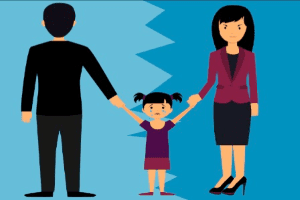Parental Alienation: When a couple who happen to be parents decide to separate, the one who suffers the most is the child.

divorce Especially when the breakup is messy, it's hard, but when the couple has a child, it can make it even harder.
Like any other parent, you may want to keep your child, but if your spouse turns against you and you lose custody, life can't get any worse for you.
When an ex-spouse attempts to distance a child from the other parent using various strategies, it is called parental alienation. Parental alienation can have harmful effects on the child.
If you feel like your child is distancing himself from you, it may be due to parental alienation. Read on to learn what it is and how to deal with it.
Do you need: Pediatric Endocrine Problems - How a Pediatrician Can Help Your Child?
What is parental alienation?
When the relationship between parents becomes toxic and they divorce or go through a traumatic separation, the child suffers the most. Sometimes the child doesn't receive enough love and care and feels neglected. One parent may try to distance the child from the other parent using techniques such as brainwashing or alienation.
This is parental alienation, or a type of emotional estrangement from the parents. The child ends up believing these things when they are repeatedly said about the spouse. This affects the child's behavior in the long run.
What causes parental alienation؟
Parental alienation primarily begins with harboring contempt and negative feelings toward the non-custodial parent. When a parent has custody of a child, it makes the youngsters feel that their spouse is at fault for all wrongdoings. This causes the child to distance themselves from the non-custodial parent and completely avoid them even though they have done nothing wrong. As a result, the non-custodial parent experiences various psychological and emotional responses from the caregiver parent.
When does parental alienation become a syndrome?
Parental alienation syndrome isn't officially a clinical or medical syndrome, but that doesn't mean its effects aren't long-lasting. The person being criticized is the alienated parent, while the person brainwashing the other parent is the alienator.

The child may have had a good relationship with the other parent before the separation, but after the divorce, the parent without custody may not be able to spend enough time with the child.
The other parent may brainwash the child, and they may begin to believe lies. Sometimes, the damaged parent-child relationship can negatively impact the mental health of both the child and the non-custodial parent. However, parental alienation syndrome is not officially recognized as a syndrome in the medical field.
It's not something a child can identify with, but yes, it can affect them emotionally and mentally. Signs that a parent is alienating Parental alienation affects the parent as much as it does the child. It can be emotionally upsetting for a parent to see their child (and the other parent) alienate them.
Do you need: Hormonal imbalance, vitamins and minerals to improve it in the body?
Signs of a child's alienation from one of the parents due to parental alienation
- The child refuses to talk to the other parent. The child may criticize the other parent for no reason and unfairly push them out of their life. Such actions fuel faulty reasoning, prejudice, and assumptions.
- An abusive parent may prevent a child from seeing the other parent. The abusive parent may prevent a child from seeing the other parent by making false claims, such as that the other parent is busy or uninterested in seeing the child. This can make the child angry and upset with the other parent, and the child may begin to harbor negative feelings toward the other parent.
- The child asks the other parent not to attend parent-teacher conferences. When a child asks a parent not to attend parent-teacher conferences or shows no interest whether the other parent is present or not, this is a clear sign that the parent is alienating. In extreme cases, the removed parent may not be listed as a contact person or guardian on the school record.
- The child's disrespect for the other parent. The close parent may sometimes manipulate the child and say negative things about the other parent, and as a result, the child may begin to disrespect the other parent. The child may throw tantrums or have extreme reactions even if the unrelated parent speaks up for them.
- The child misrepresents favors. When the distant parent tries to treat the child or do something nice for them, the child, who is influenced or manipulated by the close parent, will ignore those acts of kindness from the other parent. The child may mistreat their favors—the distant parent may feel they owe them things. And when their wishes end up being granted, they act as if it isn't good enough or they should do more. It's a vicious and emotionally draining cycle.
- The distant parent discourages the child from taking their belongings to the other parent's home. The child may be reluctant to bring their belongings when visiting the other parent. The alien parent may encourage them to keep their belongings or store them in their home when visiting the other parent. The alien parent may even ask the child not to bring anything from the alien parent's home.
- The distant parent reveals details of their relationship with the child. A parent may reveal intimate details about their relationship to the distant parent, revealing details they shouldn't have. This can build feelings of anger, jealousy, and negativity in the young person's mind.
- The alienated parent may try everything possible to prevent the child from visiting the alienated parent. The child may cancel plans to visit the other parent because the alienated parent has lured them into tempting activities. This may include visiting restaurants or going to an amusement park, making the other parent feel as if they are unwanted or unneeded. When questioned or confronted about confronting the parent, the child may deny any signs of manipulation or influence from the ill-advised parent. The child tells the alienated parent that it is their sole decision to reject them and how no one has control over them. This is also a telltale sign of parental alienation.
Symptoms of parental alienation in children
Parental alienation can affect a child's emotional well-being. If parents argue in front of the child, the child may observe one parent abusing the other in front of them. The distant parent may slowly brainwash the child. They may falsely accuse the other parent, and these false accusations may lead the child to push the other parent away.

Do you need: Dates, health benefits including protection against cancer and heart disease
Signs of parental alienation syndrome in children
The child criticizes the distant parent unfairly or without justification. The child has negative feelings toward the other parent. When asked about their behavior, the child may say they criticize the parent based on their own judgment. They may deny any signs of manipulation.
The child receives support from the distant parent, who may encourage such behavior. This child shows no signs of guilt for criticizing the other parent. The child's feelings of resentment or hatred are not limited to the isolated parent alone.
It may extend to members of that parent's family. The child has no solid reason not to like the distant parent or to say why he or she dislikes them. His or her judgment is based on false accusations made by the distant parent.
A child may use the same words adults use to criticize the other parent. Effects of Parental Alienation on Children: As mentioned above, parental alienation can be particularly difficult for children because its effects can last a long time, sometimes beyond adulthood.
Article source: Impact of Parental Alienation on Kids and How to Deal With It










